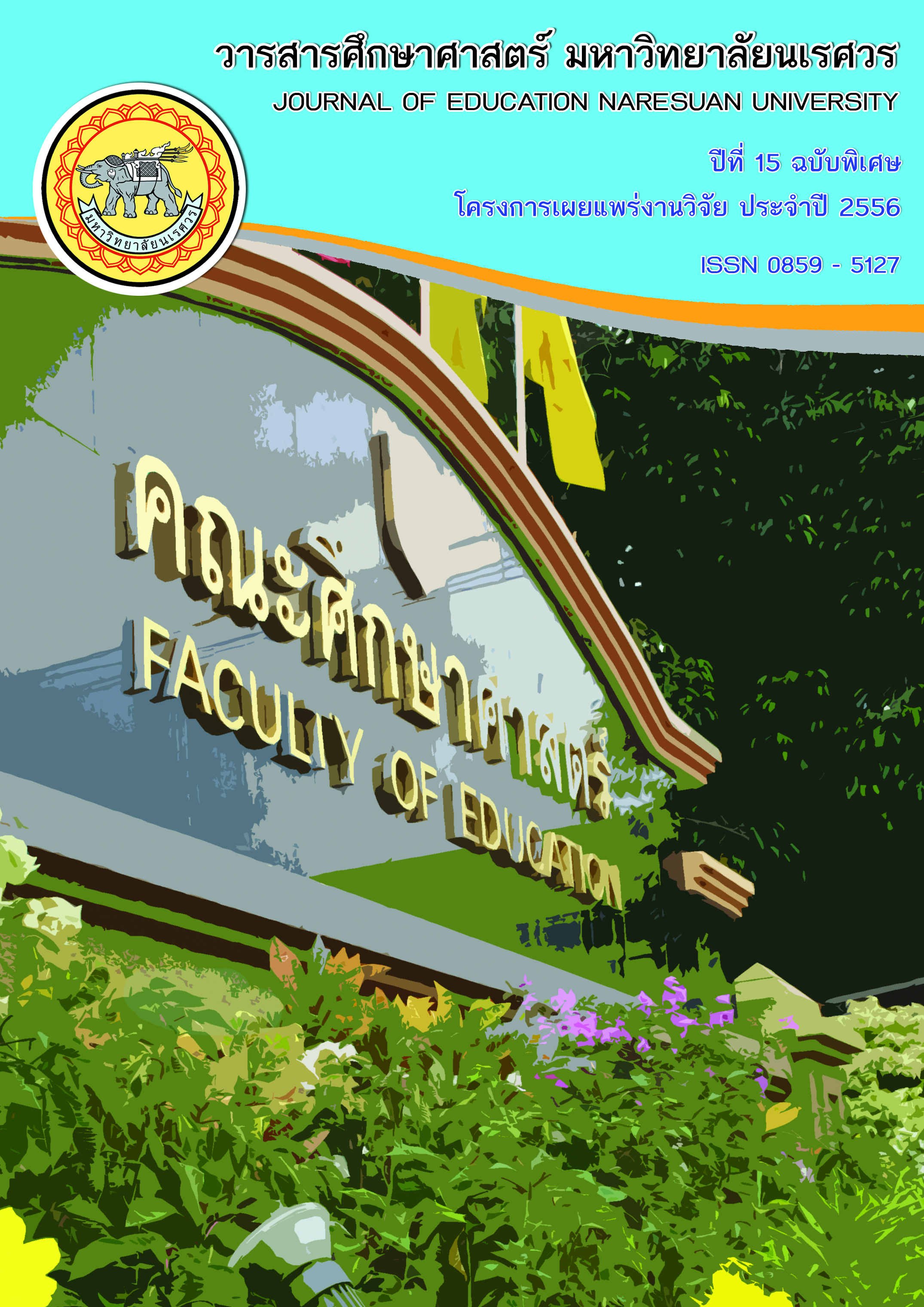การพัฒนารูปแบบการบริหารวิทยาลัยชุมชนในประเทศไทย
Main Article Content
Abstract
บทคัดย่อ
การวิจัยครั้งนี้มีจุดมุ่งหมายหลักเพื่อพัฒนารูปแบบการบริหารวิทยาลัยชุมชนในประเทศไทย มีขั้นตอนการดำเนินงาน 3 ขั้นตอนคือ ขั้นตอนที่ 1) การศึกษาสภาพปัญหาการบริหารวิทยาลัยชุมชนในประเทศไทยโดยใช้แบบสำรวจสภาพปัญหาจากกลุ่มตัวอย่างคือ สภาวิทยาลัยชุมชนจำนวน 169 คนสภาวิชาการ จำนวน 123 คนผู้อำนวยการวิทยาลัยชุมชน จำนวน 20 คนอาจารย์ จำนวน 196 คน รวมกลุ่มตัวอย่าง 508 คน ขั้นตอนที่ 2) การสร้างรูปแบบการบริหารวิทยาลัยชุมชนในประเทศไทย โดยผ่านการตรวจสอบความเหมาะสมของรูปแบบจากผู้เชี่ยวชาญโดยการสนทนากลุ่มและแบบประเมิน จำนวน 11 คน ขั้นตอนที่ 3) การประเมินความเป็นไปได้ของรูปแบบการบริหารวิทยาลัยชุมชนในประเทศไทยโดยสอบถามจากผู้อำนวยการวิทยาลัยชุมชน สภาวิทยาลัยชุมชน สภาวิชาการวิทยาลัยชุมชน จำนวน 312 คน
ผลการวิจัยพบว่า
1. สภาพการบริหารวิทยาลัยชุมชนในประเทศไทยมีปัญหาทั้ง10 ด้าน ในระดับมากโดยเรียงลำดับจากมากไปน้อย คือ1) งบประมาณ 2) ปัจจัยภายนอกที่ส่งผลต่อการพัฒนา3) การเทียบโอนระดับและผลการเรียน 4) บุคลากร 5) การประกันคุณภาพ 6) แผนงานและการบูรณาการ 7) การจัดการเรียนการสอน 8) การอำนวยความสะดวกและให้บริการ 9) นักศึกษา และ 10) การบริหารและภาวะผู้นำ
2. รูปแบบการบริหารวิทยาลัยชุมชนที่เหมาะสมประกอบด้วย 3 ส่วน คือ 2.1) ปรัชญาของวิทยาลัยเน้นการเสริมสร้างโอกาส เพิ่มคุณค่าชีวิตและศักยภาพโดยมีวัตถุประสงค์เพื่อพัฒนาทักษะของบุคคล ให้อยู่และพัฒนาชุมชน 2.2) การบริหารวิทยาลัยชุมชนองค์รวมและงานโดยใช้วิทยาลัยเป็นฐานในการพัฒนาและใช้กระบวนการบริหาร 7 หลักการที่ประกอบด้วย การวางแผน (Planning) การจัดหน่วยงาน (Organizing) การจัดคนให้เข้ากับงาน(Staffing) การสั่งการ (Directing) การประสานงาน (Coordinating) การประเมินผลและรายงานผลการปฏิบัติงาน (Reporting) และการบริหารงบประมาณ (Budgeting) โดยมุ่งเน้นความต้องการของชุมชน ยกระดับคุณภาพชีวิตผู้ด้อยโอกาส ตามความต้องการของผู้เรียนโดยมีเงื่อนไขความสำเร็จคือให้วิทยาลัยชุมชนเป็นนิติบุคคลและชุมชนเป็นเจ้าของ และผู้บริหารวิทยาลัยควรมีลักษณะเป็นผู้บริหารการเปลี่ยนแปลงที่ประสบความสำเร็จ 2.3) การจัดองค์การของวิทยาลัยชุมชนประกอบด้วยงาน 7 งาน ได้แก่ งานวิจัย งานแผนงานและงบประมาณงานความสัมพันธ์ชุมชนและเครือข่าย งานจัดการเรียนการสอนและงานวิชาการงานการบริหารทรัพยากรมนุษย์ งานประกันคุณภาพ และงานกิจการนักศึกษา โดยทุกส่วนใช้หลักการดำเนินงานพัฒนาคุณภาพที่ประกอบด้วย แผน (Plan) ปฏิบัติ (Do) ตรวจสอบ (check) และปรับปรุงแก้ไข (Action)
3. รูปแบบการบริหารวิทยาลัยชุมชนในประเทศไทย มีความเป็นไปได้ในการนำไปใช้ในในระดับมาก
คำสำคัญ: การบริหาร/ วิทยาลัยชุมชน/ ประเทศไทย/ รูปแบบการบริหารในประเทศไทย
Abstract
The main objective of this research was to develop an administration model for community collegesin Thailand. The research methods were done in three consecutive stages: Stage one wasto study the problems of the community colleges. The samples used in this study were 169 community college councils, 123 academic councils of community college, 20 directors of community colleges and 196 teachers of community colleges. The total respondents in the study consisted of 508 people. Stage two was to construct a model which was then rated its appropriateness by the experts, and focus group discussion with 11 participants. And stage three was to assess the feasibility of the newly-built administration model byquestionnaires assigned to 20 directors of community colleges, 169 community college councils and 123 academic councils of community colleges. The total number of respondents was 312.
The results of this study were:
1. The problems concerning administration in the community colleges which were found at the high level included 10 aspects: 1) the budgets, 2) the external factors that affected the development, 3) the transfer of learning and learning outcomes, 4) the community college personnel, 5) the quality assurance, 6) the plans and the integration, 7) the Instruction and learning, 8) the facilities and services, 9) the students, and 10) the management and leadership.
2. The administration model which was appropriate for community college development comprised three essential areas as followed: 2.1) Philosophy of community colleges that put an emphasis on promoting opportunities for qualities and capability of life with major objectives to develop personal skills and to help develop communities. 2.2) Total management of those community colleges should becollege-based administration which focused on the administration process including planning, organizing, staffing, directing, coordinating, reporting and budgeting. The main emphasis should consider the needs of the communities, and upgrading quality of life of the learners whose opportunities were deprived. The conditions of success required that the colleges had to become legalized ownership and community ownership. And people in administrative positions had to act as successful changing agents. 2.3) The organization management of the colleges should be consisted of seven areas: 1) the research and development, 2)management plan and budget, 3) the community relationships and community networks, 4) the management of instruction and academic affairs, 5) the human resource management, 6) the quality assurance,and 7) the administration of student affairs and services. The elements of administration should be based on the principles of quality circle, comprising of Plan, Do, Check, and Action.
3. The evaluation on possibilities to adopt the new model showed that the possibility to implement this model is at high level.
Key words: Administration/ Community Colleges/ Thailand/Thai Administration model
Article Details
The owner of the article does not copy or violate any of its copyright. If any copyright infringement occurs or prosecution, in any case, the Editorial Board is not involved in all the rights to the owner of the article to be performed.


